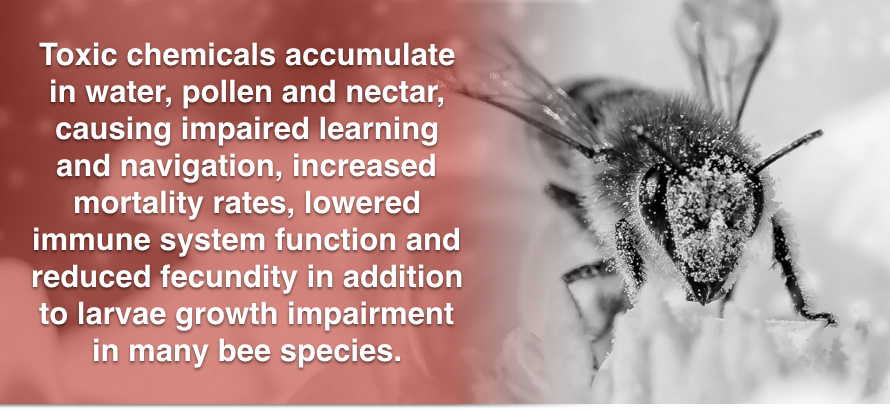Ecosystems consist of complex, interconnected systems wherein any change in environmental health will be expressed across a variety of vulnerable species. Honey bees and other pollinators are one example. These creatures offer valuable services to our environment and even to our global economy. An estimated ¾ of global crop species, ranging from apples to onions, rely on pollination by bees and other beneficial insects, contributing $18 billion to agriculture in the United States alone.
Bees are one of many animals, including birds, bats and butterflies, which transfer pollen and seeds from one flower to another, fertilizing plants so they can grow and produce food. Cross-pollination helps 40% of the world’s crops and 90% of our wild plants to thrive. Without bees, many plants – including agricultural crops mankind relies on for food – would die, substantially reducing the world’s food supply.
A few years ago, commercial beekeepers around the world started noticing that bees were dying and disappearing for unknown reasons. At times, complete hives just disappeared. Other times, the colony numbers began to significantly decline, especially during winter. This phenomenon is now known as colony collapse disorder and has affected honeybees since the beginning of the millennium. The use of pesticides had always been suspected of playing a key role in the phenomena, but it wasn’t until recently that the compelling body of evidence clearly demonstrated that the widespread prophylactic use of traditional synthetic chemicals across our fields causes acute and chronic impacts within the bee population, among other sectors. These toxic chemicals accumulate in water, pollen and nectar, causing impaired learning and navigation, increased mortality rates, lowered immune system function and reduced fecundity in addition to larvae growth impairment in many bee species, as well as other beneficial insects and non-target species. For example, the rusty-patched bumblebee has had an 87% population decrease since the 1990s, and is the first bee to be listed as an endangered species. The pervasive overuse of synthetic pesticides, land clearing and climate change in modern agriculture have caused a near 30% decline just last year in many pollinators around the world, creating significant issues for farmers.
The most widely used class of synthetic pesticides in the world today, neonicotinoids, are nicotine-based neurotoxins that are considered a primary cause in bee colony collapse disorder, a catastrophic global trend over the last decade. Over the past few years the Environmental Protection Agency and the European Union’s Environmental Regulator have been reviewing the scientific literature on all approved neonicotinoids in order to determine which substance should be banned. The EU placed a ban on three neonicotinoids in 2013, and has banned several types of other pesticides in commercial and private use. The EPA has temporarily halted the approval of new neonics while their risks are properly reviewed and understood.
Colony Collapse Disorder in America
Now that the mindset has changed, the next step is to invest in and utilize more natural, biodegradable, environmentally friendly and highly efficient alternatives in crop protection. Due to the social and political driving factors behind the push towards sustainability, biochemical pesticides are primed to dominate the biological pesticide market. One of the most effective, non-toxic, and environmentally beneficial of scalable biopesticides available on Earth can be found in the neem tree.
Neem offers a cost effective and non-toxic alternative to a number of synthetic pesticides. Azadirachtin, a chemical compound found exclusively in the neem tree, holds the secret to organic and sustainable crop care. Biodegradable and non-toxic to mammals, azadirachtin disrupts the growth cycle of insects and deters them from feeding on plants. This compound is effective against an estimated 600 species of insects and has no recorded impact on beneficial insects such as bees and other pollinators. Since the compound is only effective when ingested, non-target insects are not affected.
Primal Group is in the process of implementing bee colonies on-site at our neem projects. Over the coming months, we will partner with the Federal University of Ceará, inviting students and professionals onto the plantations to study and demonstrate the viability of neem as a natural pesticide and fertilizer that functions in harmony with beneficial insects such as bees.


